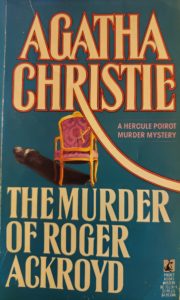
Once again, in the interest of reducing our possessions, my wife and I read a book we will want to read but will be willing to part with afterwards. For this we chose The Murder of Roger Ackroyd by Agatha Christie. When we found the A.C. books in the basement, belonging to our son but being given by him to his sister (in his own effort of dis-accumulation), along with some other of her books in the house having come to us from various sources, I put them all in order based on what I thought was the order Christie had written them. I thought this one was the next.
It didn’t read like that, however. In this book, Hercule Poirot has retired incognito to the charming village of Kings Abbot. Alas, two deaths in the two most prominent families in the village—one an apparent suicide, one a murder—result in Poirot being called in to investigate. The result is an amazing story. I, of course, don’t want to give away who the murderer is. Suffice to say I didn’t get it right, though I had an inkling into it. A weak inkling.
This book is Christie at her best. Poirot speaks often of the “little grey cells” and his “little ideas”. He muses, ponders, engages other people to help him, and keeps his cards hidden. As the story unfolds, all suspicion is on one person. After the butler is ruled out that is. (It’s always the butler, isn’t it? Unless it’s the footman, but in this book there aren’t any footmen.) But other people also had motive and means. Opportunity was a difficulty, as the apparent time of the murder was fairly precise and as alibis abounded. Two people didn’t have them. One of those disappeared. As the stories are told, it looks like everyone could have done it.
While the writing is a bit old fashioned by today’s standards it is not archaic. On occasion I had to re-read a sentence or paragraph to make sure I understood what was being said in dialog or narrative.
In detective novels earlier than Christie, such as the Sherlock Holmes series, the author did not give sufficient clues to the reader for them to figure it out. But Christie came much closer to that. When we came to the end of the novel and all was revealed, we decided to go back to the beginning and read it again, to see if we missed such clues (or “clews” as this book has it). Yes, they were there, but very subtle. I don’t feel badly for having missed them.
So this book is 5-stars. I probably won’t bother to review it on Amazon or Goodreads. Agatha Christie’s reputation is solid with out my few words. The question I always ask in all of my reviews is: is it a keeper? Alas, no. Too many other books to read or re-read to pick this one up again. Once we get through the A.C. books, they will go to our daughter as our son wanted. Too many books, too little time to keep Christie on our shelves permanently.